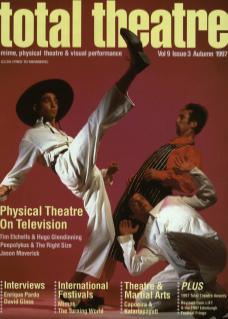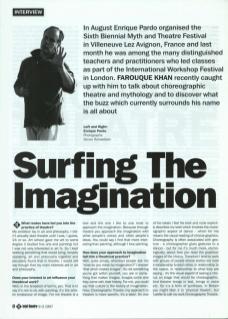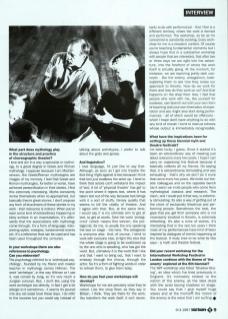What routes have led you into the practice of theatre? My ambition lay in art and philosophy. I did n't actually start theatre until I was, I guess, 24 or so. Art school gave me art to some degree (I studied fine arts and painting) but I was not very interested in art hi. So I kept seeking something that would bring, broadly speaking, art and philosophy together and peculiarly found that in theatre. I would still say though that my main interests are in art and philosophy.
Does your interest in art influence your theatrical work? Well, in the broadest of terms, yes. That is to say it's not to do with painting, it's the artistic endeavour of image. For me theatre is a tool and the one I like to use most to approach the imagination. Because through theatre you approach the imagination with other people's voices and other people's ideas. You could say I find that more interesting than painting, although I love painting,
How does your approach to imagination fall into a theatrical practice? Well, quite simply, whenever people ask me 'what do you mean by imagination?" I answer that which makes images". It's not something you've got within yourself, you are in something that makes images. Images come and they come with their history. For me, you could say that culture is the history of imagination. Now, Choreographic Theatre (my approach to theatre) is more specific. It's a label. It's one of the labels I feel fits best and most explicit ly describes my work which involves the choreographic aspect of dance. which for me means the visual reading of chorus-graphics. Choreography is often associated with gesture. a choreographer gives gestures to a dancer - but for me it's much more, etymologically, about how you read the graphics/ images of the chorus. Therefore I tend to work with groups of people whose bodies are read in relationship to each other, in relationship to the space, in relationship to what they are saying - it's the visual aspect of seeing a chorus on stage that would be choreographic. And theatre brings in text, brings in voice etc. So it's a form of synthesis. In Britain you might liken it to 'physical theatre', but I prefer to call my work Choreographic Theatre.
What part does mythology play in the structure and practice of choreographic theatre? I love and am in a way a specialist in mythology, to a great degree in Greek and Roman mythology. I suppose because I am Mediterranean, the Greek/Roman mythologies are images of my memory. I feel that Greek and Roman mythologies, for better or worse, have achieved personification in their stories. I find this extremely interesting. Myths constantly renew themselves when re-approached, but basically they're great stories. I don't propose any form of enactment of these stories in my work - their relevance is indirect. When you've seen some kind of extraordinary happening or story surface in an improvisation, it's afterwards that the associations with mythology come through. It's a form of language; interpreting styles, energies, fundamental events etc. It's a reference that can be used and has been used throughout the centuries.
In your workshops there are also references to psychology. Can you elaborate? The psychology referred to is 'archetypal psychology', founded by my friend and master teacher in mythology James Hillman. The word 'archetype', in the way Hillman or use it, was coined by Jung, so it's very much a Jungian concept. But, I don't like using the word archetype too directly, in fact I get a bit allergic to it sometimes it seems it's poured into any old salad bowl these days. I do refer to the sources but you could say instead of talking about archetypes, I prefer to talk about the gods and gossip.
And linguistics? I love language, I'd just like to say that. Although, as soon as I get into theatre the first thing I fight against is text because I think that text just swallows the actor up. I tend to think that actors can't withstand the impact of text. A lot of physical theatre' has got to the point where it rejects text, where it has taken text out of the way because text brings with it a sort of stuffy, literary quality that seems to kill the vitality of theatre. And I agree with that. But, at the same time, I would say it is my ultimate aim to get at text, to get at words. Take the word 'protagonist' (which means first winner), the protagonist, for me, is usually the one speaking the text on stage - the hero. The antagonist is everyone else. And, of course, I tend to work with everyone else, to fight this idea that the whole stage is going to be swallowed up by the one who is speaking, who has got the word. But, ultimately it is the word that I like and that I want to bring out, that I want to embody through the chorus, through the actor. So it's a form of fighting words in order to refresh them, to give them body.
How do you feel your workshops will develop? Workshops for me are precisely what they're called. Like the shop floor; as they say in Britain, I think. They are there for the work. You transform the work itself. It isn't necessarily to do with performance - that I feel is a different territory, where the work is formed and performed. The workshop, as far as I'm concerned is constantly evolving. Every workshop for me is a research context. Of course you're teaching fundamental elements but I always hope that in a substantial workshop with people that are interested, that after two or three days we are right into the adventure, into the forefront of where the work itself is actually going. At the moment, for instance, we are exploring pretty dark concepts - like the enemy, antagonism, hateexploring them to see how they renew our approach to theatre. How do we work for them and how do they work on us? And that happens on the shop floor. Also, I feel that people who work with me, like yourself for instance, can branch out with your own form of teaching and your own thematics of exploration and you might also start doing performances - all of which would be offshootswhich I hope don't have anything to do with any kind of mould. I tend to distrust schools whose output is immediately recognisable.
What have the inspirations been for setting up these biennial myth and theatre festivals? I've been lucky, I guess. Since it started it's been an extraordinary way of meeting just about everyone every two years. I hope I can carry on organising this festival because it basically collects all my friends. On saying that, it is extraordinarily stimulating and very exhausting - that's why we don't do it more than once every two years. We invite our theatre colleagues and on the opposite bench (as it were) we invite people who come from mythological classics and research. The clash, and I would put it that way, is extremely stimulating. Its also a way of getting out of the circle of exclusively theatrical and performing people. Sometimes the look, the gaze that you get from someone who is not necessarily involved in theatre, is extremely refreshing. It's also a mine of stories. It's interesting that in the last ten years I think most of my performances have kind of been inspired by dialogues of events happening at the festival. It really tries to be what its title says - a myth and theatre festival.
Did your recent workshop for the International Workshop Festival in London continue with the theme of the enemy' explored at the 6th biennial? The IWF workshop was titled 'Shadow Boxing', an idea which I've tried previously in England. It's intimately related to the notion of the enemy, as the idea deals with the actor boxing shadows on stage. You could say that I give myself huge waves and at the moment the notion of the enemy is the wave that I am surfing.


